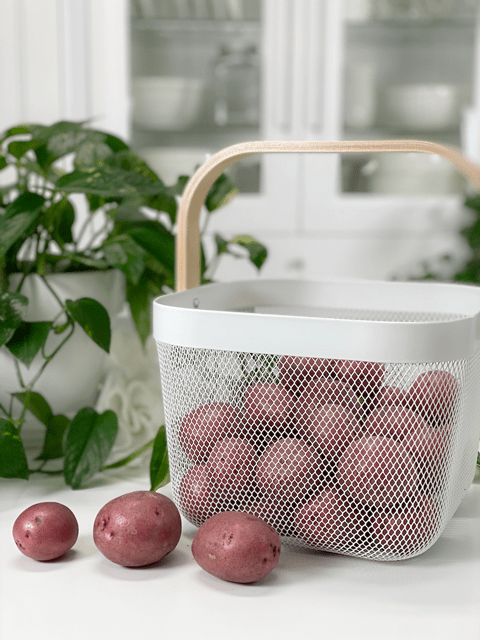How to Store Potatoes

 Add to favorites
Add to favorites
Potatoes are an incredibly healthy source of fuel. They are nutrient-packed and have no fat, sodium, or cholesterol. These eco-friendly self-wrapped veggies are jam-packed with essential vitamin B6, fiber, magnesium, and antioxidants. Did you know that they have more potassium than a banana and nearly half your daily value of vitamin C?
 Selecting the Best Potatoes
Selecting the Best Potatoes
Before I dive into how to store potatoes, it’s important that we start off with the best potatoes. In my experience, organic potatoes don’t have as long of a shelf life as conventionally grown ones. But don’t let that deter you, because after you read the following information, you will want to purchase only organic potatoes.
- According to the USDA’s Pesticide Data Program, 35 different pesticides have been found on conventional potatoes. Of these, 6 are known or probable carcinogens, 12 are suspected hormone disruptors, 7 are neurotoxins, and 6 are developmental or reproductive toxins.
- As a root vegetable, they absorb all of the pesticides, herbicides, and insecticides that are sprayed above the ground and then eventually make their way into the soil. With potatoes, however, the chemical treatment is quite extensive. During the growing season, they are treated with fungicides. Before harvesting, they get sprayed with herbicides to kill off the fibrous vines. After being dug up, they are sprayed again to prevent them from sprouting.
- Select firm, unbruised, and relatively smooth potatoes.
- Pass over green-tinged potatoes; they contain toxic alkaloids, such as solanine, that the potato develops when exposed to light.
- It is best to buy potatoes that are unpackaged and unwashed, to avoid bacterial buildup.
How to Store Potatoes
- Do not wash prior to storing, as it removes the protective coating from the skins.
- Keep potatoes in a dark, dry, cool place, around 45-50°F (7-10°C). Higher temperatures (even room temperature) can cause potatoes to sprout and dehydrate.
- Potatoes should be stored outside the refrigerator, or their starch content will turn to sugar, making them taste bad.
- Avoid direct sunlight. Sun exposure can form solanine, which is toxic and will make them turn green.
- Do not store them next to onions, because the gases they emit will cause damage to both.
- Place potatoes in either a burlap or paper bag when storing them.
- If you are lucky enough to grow them yourselves, after harvesting from the garden, lay them out in a single layer in a dark and airy place to let the soil dry on to the tuber. Lightly brush off excess dirt before you store them.
- Keep an eye on them; one bad potato can spoil a bagful.
Looking for Potato Based Recipes?
© AmieSue.com
Tags: Resistance Starch, Starch Solution



 Add to favorites
Add to favorites
 Selecting the Best Potatoes
Selecting the Best Potatoes